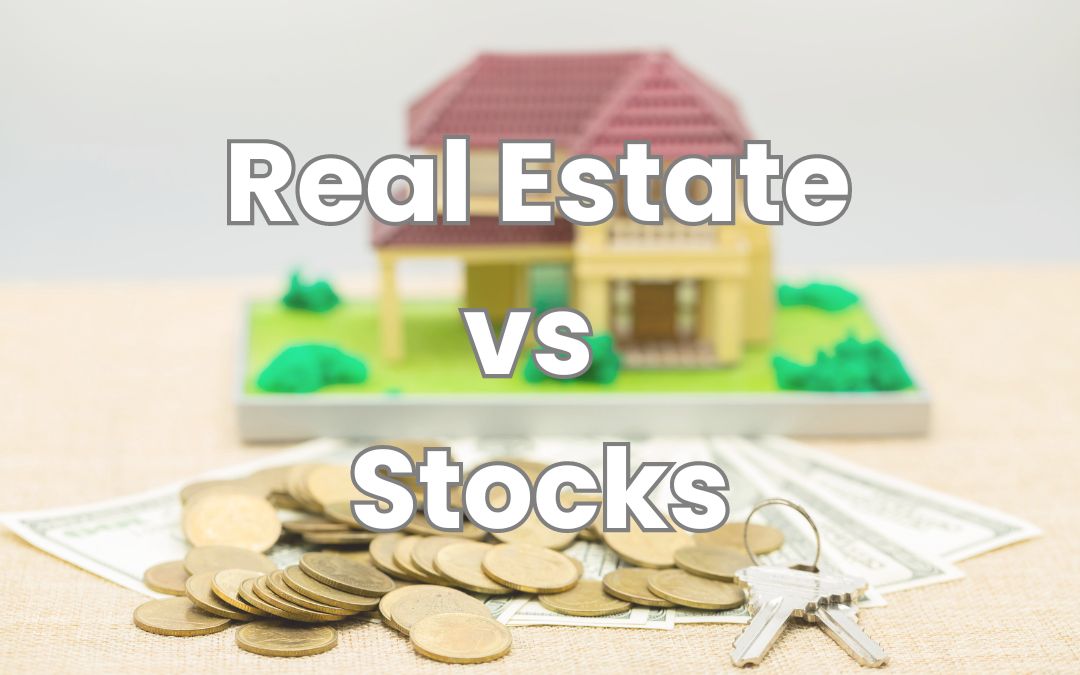When it comes to choosing the best investment strategy, the debate between real estate vs stocks has been ongoing for years. Both investment options offer unique benefits and challenges, making it essential to understand which might suit your financial goals better. In this article, we’ll delve into the differences between investing in real estate and the stock market, comparing their potential returns, risks, and other crucial factors that can influence your decision.
Understanding the Basics: Real Estate vs Stocks
Before diving into a detailed comparison, it’s crucial to grasp what each investment entails.
Real Estate Investment: This involves purchasing physical property—residential, commercial, or land—with the intention of generating rental income, capital appreciation, or both. Real estate investments can include buying homes, rental properties, office spaces, or even land that may appreciate over time.
Stock Market Investment: Investing in stocks means buying shares in publicly traded companies. When you purchase stock, you own a piece of the company, and your returns come in the form of dividends and capital gains as the stock price increases. Stocks can be traded on various exchanges, offering liquidity and the ability to diversify your investment portfolio easily.
Key Factors to Consider
1. Potential Returns
When comparing real estate vs stocks, potential returns are a primary consideration for investors. Historically, both real estate and stocks have provided solid returns, but the nature of these returns can differ significantly.
Real Estate: Real estate offers two types of returns: rental income and property value appreciation. Rental properties can provide a steady income stream, and the value of the property itself may increase over time, leading to substantial capital gains. According to historical data, real estate in India has provided average annual returns of around 8-12% over the long term.
Stocks: The stock market has historically offered higher average annual returns compared to real estate, typically ranging from 10-15%. Stocks can provide quick returns through capital gains and dividends, but they are also more volatile and can fluctuate significantly in value.
2. Risk Factors
Risk is an inherent part of any investment. Understanding the risks associated with real estate vs stocks is crucial for making an informed decision.
Real Estate: Real estate is generally considered less volatile than stocks, but it comes with its own set of risks. These include property market fluctuations, maintenance costs, tenant vacancies, and potential legal issues. However, real estate tends to be more stable in the long term and can provide a hedge against inflation.
Stocks: Stocks are known for their volatility. Stock prices can be influenced by various factors, including economic conditions, company performance, and market sentiment. While the potential for high returns is greater, so is the risk of significant losses. However, stocks are highly liquid, allowing investors to buy and sell shares quickly in response to market conditions.
3. Liquidity
Liquidity refers to how quickly an investment can be converted into cash without significantly affecting its value.
Real Estate: Real estate is generally considered an illiquid asset. Selling a property can take time—weeks, months, or even years—depending on market conditions and the property’s location. This lack of liquidity means that real estate is typically a long-term investment.
Stocks: Stocks are highly liquid. They can be bought and sold on the stock exchange within seconds during trading hours. This liquidity offers flexibility to investors who may need to access cash quickly or react to market changes.
Also Read: From Rags to Riches: How Real Estate Can Make You Wealthy?
Cost of Investment
Another critical factor in the real estate vs stocks debate is the cost of investment.
Real Estate: The cost of investing in real estate is generally higher than in stocks. It involves upfront costs such as down payments, property taxes, insurance, maintenance, and transaction fees. Additionally, real estate investments may require financing, which adds interest costs over time.
Stocks: Investing in stocks requires significantly less capital to get started. You can buy shares with as little as a few hundred rupees. Transaction costs are also relatively low, with brokerage fees and taxes being the primary expenses.
Table: Comparison of Costs in Real Estate vs Stocks
| Cost Factor | Real Estate | Stocks |
|---|---|---|
| Initial Investment | High (down payment, closing costs) | Low (buying shares) |
| Maintenance/Upkeep Costs | High (repairs, property management) | None |
| Transaction Fees | High (agent fees, legal fees) | Low (brokerage fees) |
| Ongoing Expenses | High (property tax, insurance) | Low (account fees, minimal taxes) |
Tax Implications
Tax benefits are an important aspect to consider when deciding between real estate vs stocks.
Real Estate: Real estate investors can take advantage of several tax benefits, such as deductions on mortgage interest, property taxes, and depreciation. These can significantly reduce taxable income and improve net returns.
Stocks: Investors in the stock market can benefit from lower long-term capital gains tax rates if they hold onto their investments for more than a year. Additionally, dividends may be taxed at a lower rate, depending on the investor’s tax bracket.
Table: Tax Benefits Comparison
| Tax Benefit | Real Estate | Stocks |
|---|---|---|
| Depreciation Deduction | Yes | No |
| Capital Gains | Yes, on property sale | Yes, on stock sale |
| Dividend Income | Not applicable | Yes, taxed at lower rates |
| Mortgage Interest Deduction | Yes | Not applicable |
Diversification
Diversification is a key strategy in managing investment risk. It involves spreading investments across different asset classes to reduce exposure to any single asset.
Real Estate: Real estate can be a valuable part of a diversified investment portfolio, especially if combined with other types of assets like stocks, bonds, or mutual funds. However, real estate investments are typically more concentrated, as purchasing multiple properties requires significant capital.
Stocks: The stock market offers a high level of diversification. Investors can spread their risk across various industries, companies, and geographies by investing in different stocks or through mutual funds and ETFs. This broad exposure can help mitigate risks associated with individual companies or sectors.
Understanding Market Timing
One crucial aspect of the real estate vs stocks debate is market timing, which can significantly impact the returns on your investment.
Real Estate: Timing the real estate market is challenging due to the long-term nature of property investments. Market cycles in real estate tend to be slower, with periods of boom and bust often lasting several years. Investors need to consider economic conditions, interest rates, and local property trends when deciding to buy or sell real estate.
Stocks: The stock market is more sensitive to short-term fluctuations, making market timing a more critical factor. Investors often rely on technical analysis, market sentiment, and economic indicators to time their entries and exits. However, trying to time the stock market perfectly can be risky, and many experts recommend a long-term investment approach to ride out volatility.
Final Thoughts
When weighing real estate vs stocks, the best investment choice ultimately depends on your financial goals, risk tolerance, and investment horizon. Real estate vs stocks is not about choosing one over the other but rather understanding how each can fit into your overall investment strategy. Real estate offers stability, long-term appreciation, and tax benefits, making it an excellent choice for those looking for a tangible, long-term investment. On the other hand, stocks offer higher liquidity, ease of entry, and the potential for significant returns in a shorter period, making them ideal for investors who can handle higher volatility.
Both investment options have their merits, and many investors find success by including both real estate and stocks in their portfolios to achieve a balanced, diversified approach to wealth building.






